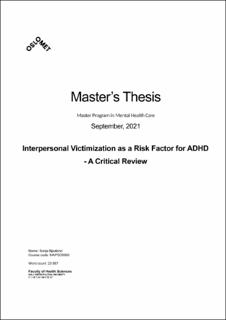Interpersonal Victimization as a Risk Factor for ADHD - A Critical Review
Master thesis
Published version
Permanent lenke
https://hdl.handle.net/11250/2985005Utgivelsesdato
2021Metadata
Vis full innførselSamlinger
Sammendrag
In mental health care today, the theory that interpersonal victimization may cause Attention Deficit Hyperactivity Disorder (ADHD) has become progressively influential and is increasingly impacting clinical practice in the field. This is partially the result of a number of studies that have found an association between interpersonal victimization, such as child maltreatment or bullying, and ADHD. However, establishing causality in life-course research is a challenge. Human development is a dynamic and complex process and consequently, abundant with possible confounding factors. This study attempts to address the research question: Is interpersonal victimization a risk factor for ADHD? The process began with a systematic search for relevant studies and papers in PubMed and PsychINFO. Longitudinal studies that performed pre- and post-tests of both predictor and outcome variables were included. The initial search results contained hundreds of studies, but only six studies met the criteria and were reviewed. Two studies examined polyvictimization and four studies examined peer victimization. In reviewing those empirical studies that examined interpersonal victimization as a risk factor for ADHD, results suggest that interpersonal victimization may be a small risk for increased ADHD symptoms. However, this effect seems to be temporary. Moreover, there appears to be substantial confounding affecting the association between victimization and ADHD. When controlling for genetics the association between victimization and ADHD disappears or is substantially reduced. The lack of studies with a minimal control for confounding suggests a need for further research in this area and clinical caution.
